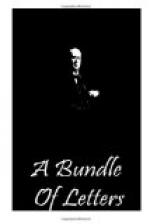Author: Henry James
Release Date: May 8, 2005 [eBook #2425]
Language: English
Character set encoding: ISO-646-us (us-ASCII)
***Start of the project gutenberg EBOOK A bundle of letters***
Transcribed from the 1887 Macmillan and Co. edition by David Price, email ccx074@coventry.ac.uk. Proofing by Andy McLauchan and David Stapleton.
A BUNDLE OF LETTERS by Henry James
CHAPTER I
FROM MISS MIRANDA MOPE, IN PARIS, TO MRS. ABRAHAM C. MOPE, AT BANGOR, MAINE.
September 5th, 1879.
My dear mother—I have kept you posted as far as Tuesday week last, and, although my letter will not have reached you yet, I will begin another before my news accumulates too much. I am glad you show my letters round in the family, for I like them all to know what I am doing, and I can’t write to every one, though I try to answer all reasonable expectations. But there are a great many unreasonable ones, as I suppose you know—not yours, dear mother, for I am bound to say that you never required of me more than was natural. You see you are reaping your reward: I write to you before I write to any one else.
There is one thing, I hope—that you don’t show any of my letters to William Platt. If he wants to see any of my letters, he knows the right way to go to work. I wouldn’t have him see one of these letters, written for circulation in the family, for anything in the world. If he wants one for himself, he has got to write to me first. Let him write to me first, and then I will see about answering him. You can show him this if you like; but if you show him anything more, I will never write to you again.
I told you in my last about my farewell to England, my crossing the Channel, and my first impressions of Paris. I have thought a great deal about that lovely England since I left it, and all the famous historic scenes I visited; but I have come to the conclusion that it is not a country in which I should care to reside. The position of woman does not seem to me at all satisfactory, and that is a point, you know, on which I feel very strongly. It seems to me that in England they play a very faded-out part, and those with whom I conversed had a kind of depressed and humiliated tone; a little dull, tame look, as if they were used to being snubbed and bullied, which made me want to give them a good shaking. There are a great many people—and a great many things, too—over here that I should like to perform that operation upon. I should like to shake the starch out of some of them, and the dust out of the others. I know fifty girls in Bangor that come much more up to my notion of the stand a truly noble woman should take, than those young ladies in England. But they had a most lovely way of speaking (in England), and the men are remarkably handsome. (You can show this to William Platt, if you like.)




